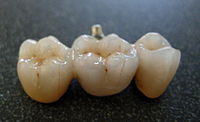
Photo from wikipedia
Abstract Lithium disilicate glass-ceramics are promising dental restoration materials that have been developed for clinical applications because of their good bioactivity and mechanical properties. The aim of this study was… Click to show full abstract
Abstract Lithium disilicate glass-ceramics are promising dental restoration materials that have been developed for clinical applications because of their good bioactivity and mechanical properties. The aim of this study was to analyze the phase formation to form lithium disilicate glass-ceramics synthesized from SiO2-LiO2glass systems by adding CeO2(0-1.5 wt%). The effects of various heat-treatment temperature and CeO2on the microstructure and mechanical properties of the samples were investigated. Li2Si2O5and Li2SiO3phases were observed in all samples. The results showed that the proportion of Li2Si2O5slightly increased with an increase in the amount of CeO2. The optimum heat treatment temperature resulting in maximum mechanical values for samples containing 1.5wt% CeO2were heating in a first step at 600°C and a second step at 800°C for 1 h each. Testing of bioactivity demonstrated that lithium disilicate glass-ceramic doped CeO2 is bioactive to activate protein production and stimulate ALP activity.
Journal Title: Journal of Non-crystalline Solids
Year Published: 2021
Link to full text (if available)
Share on Social Media: Sign Up to like & get
recommendations!